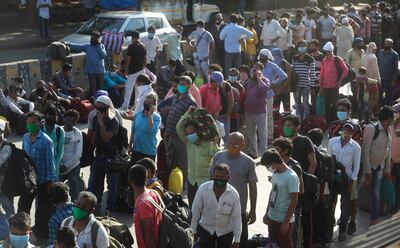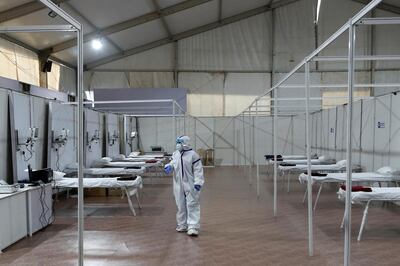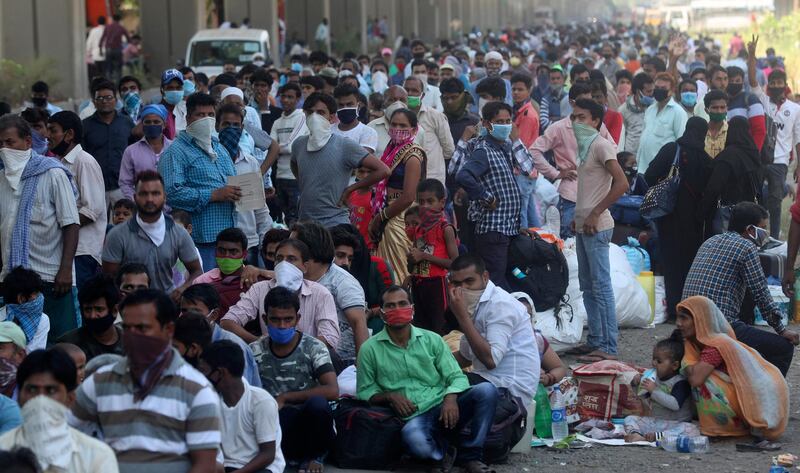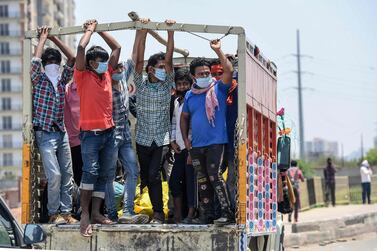In the heart of Mumbai's modern business district, home to multinational banks and five-star hotels, work has just been completed on a 1,000-bed temporary hospital for Covid-19 patients. It was built in just a couple of weeks.
Surrounding the emergency facility, the normally bustling offices and trendy restaurants in the area, housed in steel and glass buildings, have been deserted as employees work from home during a lockdown that began in March, aimed at stemming the spread of the coronavirus.
While other parts of India have now started to ease lockdowns, allowing some employees to return to work, Mumbai's restrictions remain. With more than 27,000 confirmed cases, the city has the highest number of Covid-19 infections in the country.
The strict lockdown means that most offices and shops have been closed since March 25. It is taking its toll on the health of businesses in the country's financial capital.
Among those impacted is Aakash Doshi, who owns Zest Events, a wedding and event management company.
“We understand that all industries have suffered,” says Mr Doshi. “But in the wedding industry, there's a huge impact because of the lockdown, and I can see no jobs, no opportunities right now. All the weddings are either delayed, postponed, or cancelled.”
As the coronavirus pandemic hit and the nationwide lockdown came into effect, his company had to cancel its lavish functions, including destination weddings planned for Abu Dhabi and Bahrain.
A major challenge is that there is great uncertainty on how to move forwards because it is not clear when restrictions will be lifted, he adds.
“Honestly, people are clueless about what will happen and we can't plan anything,” says Mr Doshi.
The lockdown has prompted economists to slash their gross domestic product forecasts for India for the current financial year, with Goldman Sachs projecting that the country's economy will contract by 5 per cent.
Mumbai is the economic powerhouse of the state of Maharashtra in western India, which is the highest contributor to India's GDP.
Maharashtra accounted for 14.89 per cent of India’s gross domestic product in the financial year ending March 2018, according to the latest data available from the India Brand Equity Foundation. The state's GDP stood at $453.99 billion in the last financial year.
Mumbai's major industries include banking and financial services, pharmaceuticals, and gems and jewellery.
And the city's economy thrives on migrant labour from other states. But left without work and income, many migrant workers have left Mumbai and returned to their homes, for now.
As train services opened up this month to enable migrants to return to their towns and villages, workers packed up their belongings and fled Mumbai in droves.
This is a major worry for companies who fear that staff will not be readily available once activity restarts.
“The manufacturing sector would have a tough time ahead as lot of migrant labour has gone back to their native hometowns and it will be difficult to call them back as they [had] a harrowing time during the lockdown,” says Neeraj Bhagat, the founder of accountancy firm Neeraj Bhagat & Co.
With private offices still largely shut, he says this “will have long term impact on [the] continuity of various small and large businesses operating out of Mumbai”.
There are a lot of small businesses that have been left completely without revenue during the lockdown, and Mr Bhagat notes that some of these may not be able to survive.

One hair salon owner in the south of the city whose shop has been closed since March, says that the impact of the Covid-19 pandemic is financially “far worse than demonetisation” for him.
Demonetisation was a move by prime minister Narendra Modi's government in 2016 to ban the two highest value banknotes banned overnight with a view to curbing black market activity and tax avoidance. The move led to a drying up of liquidity and some businesses closing down.
During the lockdown, there have been efforts by the Indian government to try to alleviate the economic strains.
This month, it unveiled a $266 billion (Dh976.9bn) economic stimulus package, which is one of the largest in the world. This included collateral-free loans for small businesses.
The Reserve Bank of India (RBI) on Friday delivered an emergency interest rate cut for the second time since the lockdown began. It reduced the key repo rate by 40 basis point to 4 per cent, and extended a moratorium on loans by another three months.
“The macroeconomic impact of the pandemic is turning out to be more severe than initially anticipated,” said Shaktikanta Das, the governor of the RBI.
However, some have complained that the measures are not enough in the circumstances. Analysts say that India's economic package is more focused on longer term measures and does not provide the instant cashflow that many businesses need.
This particularly applies to Mumbai, where the economy is virtually at a standstill. Across the city, Covid-19 quarantine and hospital facilities are springing up, with cases expected to peak in the coming weeks. The city has a population of some 20 million people, many of whom live in large slum areas, meaning that fighting the virus was likely to be a challenge.
There is a 300-bed quarantine facility being built on the car park at the city's Mahalaxmi Racecourse and the planetarium has been handed over for use as a quarantine facility.

“The overall impact on the ecosystem has been quite devastating,” says Husain Habib, the co-founder of digital marketing firm Hats-Off Digital.
The company has had to cut salaries to ensure its survival.
“There are a lot of ongoing and potential clients who have kept work on hold due to the pandemic as they are not sure of investment during this time,” says Mr Habib. “We do not believe in layoffs so we have commenced a 30 per cent pay cut for all our employees.”
Keeping employees motivated as the lockdown continues is critical, business owners explain.
“It's my responsibility to keep my team members engaged and stay connected with them through audio and video conferencing tools,” says Smruti Alinje Bhalerao, the founder of Mumbai-based Prittle Prattle PR and Publicity Agency.
She adds that during these times “we have become a bit stricter over performance”.
“We have informed our team members to share periodic updates and end-of-day reports for them to justify their working hours and salary offered.”
Ms Bhalerao explains that there are some prospective clients who seem to be trying to leverage the situation to ask for heavily discounted rates, but she says “we then put our foot down and deny the offer”.
“What once looked like a year in which there would be a lot of movement has slowed down,” she adds.
A major industry in the city that has been impacted is, of course, Bollywood.
Shoots have been delayed, and there is little production work going on beyond script-writing and pre-production calls over video conference, industry insiders say.
All sectors are being forced to adjust, with the number of Covid-19 cases yet to peak in India.
Adapting his company's business strategy is key for Mr Doshi.
He points out that even when the weddings industry – estimated by KPMG to be worth $50 billion a year in India – is able to resume, the future of the sector may look very different.
If social distancing becomes the norm, then he realises that his company for some time may not be able to stage large-scale weddings in destinations across the world, with thousands of guests.
His strategy now is to look at how his company will be able to offer smaller weddings that are closer to home.
“The pandemic has affected everyone financially and otherwise, and this will impact our business going forwards,” he says. “The plan will be to grab anything we can get. Business is business.”







